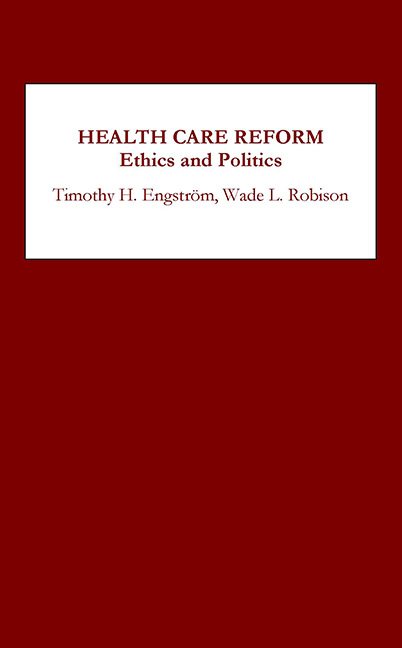Book contents
- Frontmatter
- Dedication
- Contents
- Foreword
- Preface
- Introduction: The Problems of Health Care Reform
- Part One Moral Commitments of Our Present System
- 1 The Moral Crisis in Health Care
- 2 Ethics, Justice, and Health Reform
- Part Two Moral Implications of Market-Driven Reform
- Part Three Ethical and Political Implications of International Comparisons
- Part Four Argument for Universal Principles of Health Care
- Conclusion: Prospects for Reform
- Notes on the Contributors
- Index
2 - Ethics, Justice, and Health Reform
from Part One - Moral Commitments of Our Present System
Published online by Cambridge University Press: 25 October 2017
- Frontmatter
- Dedication
- Contents
- Foreword
- Preface
- Introduction: The Problems of Health Care Reform
- Part One Moral Commitments of Our Present System
- 1 The Moral Crisis in Health Care
- 2 Ethics, Justice, and Health Reform
- Part Two Moral Implications of Market-Driven Reform
- Part Three Ethical and Political Implications of International Comparisons
- Part Four Argument for Universal Principles of Health Care
- Conclusion: Prospects for Reform
- Notes on the Contributors
- Index
Summary
Introduction
The issue of health care reform in the United States is commonly framed as an economic, political, or technical policy issue. It is less often characterized as an ethical or moral issue that necessarily touches upon the basic values of the average American.
I argue that health care reform deserves to be treated as fundamentally a moral question and that the failure to conceive of it in this way contributed greatly to the deficiencies in the national debate over health reform in 1993 and 1994. This chapter was originally prepared in 1996, and I relied very heavily for my arguments upon the work of the ethics working group of the Health Care Reform Task Force during the spring of 1993, with which I was affiliated as a consultant. I believe that most of these points remain valid today. In a postscript, I will update the discussion and reflect on the policy debates of 2004 and afterward.
Current Problem
Good ethics necessarily starts with a grasp of the facts of the case. So some discussion of the present problems facing the U.S. health care system is unavoidable.
If we were to equate “ethics” with altruistic concern for the well-being of others, it would be nice to report here that the major driving force behind health care reform in the United States has been the appreciation of the plight of the 40 million Americans (roughly) who currently lack health insurance, and the additional 20 or 30 million who are considered to be seriously underinsured. Of course, this is hardly the case because these Americans are precisely that group with the least electoral power in our current system. Instead the major push for reform has come from the rapidly escalating cost of health care. To cite only one statistic, the Wall Street Journal reported that between 1985 and 1989 (shortly after the federal government introduced the diagnosis related group (DRG) system, designed to be a major tool for cutting medical care costs), the cost of employee health care for the average U.S. corporation rose 86 percent. It is very hard to imagine sustaining such rapid rates of increase over any extended span of time.
- Type
- Chapter
- Information
- Health Care ReformEthics and Politics, pp. 40 - 58Publisher: Boydell & BrewerPrint publication year: 2006

